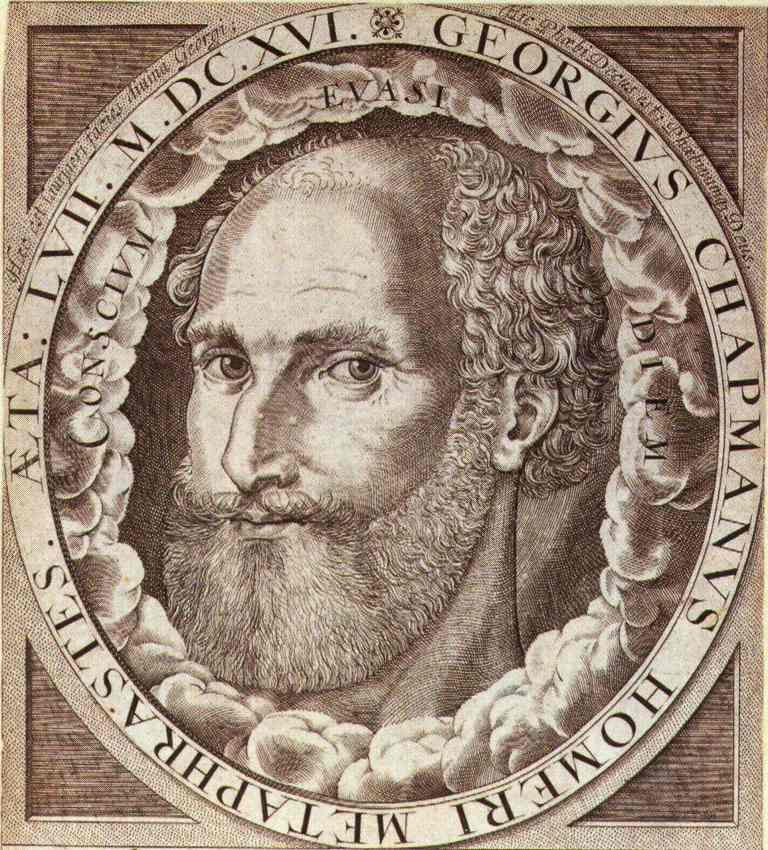
George Chapman citáty a výroky

George Chapman: Citáty anglicky
“I tell thee Love is Nature's second sun,
Causing a spring of virtues where he shines.”
Act I, scene i.
All Fools (1605)
“Make ducks and drakes with shillings.”
Act I, scene i.
Eastward Hoe (1605)
“Young men think old men are fools; but old men know young men are fools.”
Act V, scene i.
All Fools (1605)
“Cornelia. What flowers are these?
Gazetta. The pansy this.
Cor. Oh, that's for lover's thoughts.”
Act II, scene i.
All Fools (1605)
“The sea had soaked his heart through”
Homer's Odysses (1614), Book V, line 608; shipwrecked Odysseus washes up on Scheria.
Kontext: Then forth he came, his both knees falt'ring, both
His strong hands hanging down, and all with froth
His cheeks and nostrils flowing, voice and breath
Spent to all use, and down he sunk to death.
The sea had soaked his heart through; all his veins
His toils had rack'd t'a labouring woman's pains.
Dead weary was he.
“Danger (the spur of all great minds) is ever
The curb to your tame spirits.”
The Revenge of Bussy D'Ambois (1613), Act V, scene i.
Book I, line 1, p. 1
The Iliads of Homer, Prince of Poets (1611)
Kontext: Achilles' baneful wrath resound, O Goddess, that imposed
Infinite sorrows on the Greeks, and many brave souls loosed
From breasts heroic, sent them far to that invisible cave
That no light comforts, and their limbs to dogs and vultures gave;
To all which Jove's will gave effect; from whom first strife begun
Betwixt Atrides, king of men, and Thetis' godlike son.
Book VIII, line 487, p. 115 https://books.google.com/books?id=ashjAAAAcAAJ&pg=PA115&dq=%22As+when+about%22
The Iliads of Homer, Prince of Poets (1611)
“He is at no end of his actions blest
Whose ends will make him greatest, and not best.”
Act V, scene i; reported in Bartlett's Familiar Quotations, 10th ed. (1919).
The Conspiracy and Tragedy of Charles, Duke of Byron (1608)
The Gentleman Usher, Act IV, scene i; reported in Bartlett's Familiar Quotations, 10th ed. (1919).
“They're only truly great who are truly good.”
Revenge for Honour, Act V, scene ii; reported in Bartlett's Familiar Quotations, 10th ed. (1919).
Disputed
Act IV, scene i.
The Conspiracy and Tragedy of Charles, Duke of Byron (1608)
“He that to nought aspires, doth nothing need;
Who breaks no law is subject to no king.”
The Revenge of Bussy D'Ambois (1613), Act IV, scene i.
“As night the life-inclining stars best shows,
So lives obscure the starriest souls disclose.”
Epilogue to Translations; reported in Bartlett's Familiar Quotations, 10th ed. (1919).
Revenge for Honour (1654), Act II, scene i. Attributed, probably falsely, to Chapman. The play may have been written by Henry Glapthorne.
Disputed
“Who to himself is law no law doth need,
Offends no law, and is a king indeed.”
Act II, scene i.
Bussy D'Ambois (1607)
“Man is a torch borne in the wind; a dream
But of a shadow, summ'd with all his substance.”
Act I, scene i.
Bussy D'Ambois (1607)
“None ever loved but at first sight they loved.”
The Blind Beggar of Alexandria (1596); reported in Bartlett's Familiar Quotations, 10th ed. (1919).
Compare: "Who ever loved that loved not at first sight?" Christopher Marlowe, Hero and Leander (1598).
“For one heat, all know, doth drive out another,
One passion doth expel another still.”
Monsieur D'Olive, Act V, scene i; reported in Bartlett's Familiar Quotations, 10th ed. (1919).
“Black is a pearl in a woman's eye.”
An Humorous Day's Mirth; reported in Bartlett's Familiar Quotations, 10th ed. (1919).
Hymnus in noctem, line 1
The Shadow of Night (1594)
Preface to Ovid's Banquet of Sense (1595)
